OpenAI’s Plan to Propel U.S. AI Leadership Against China
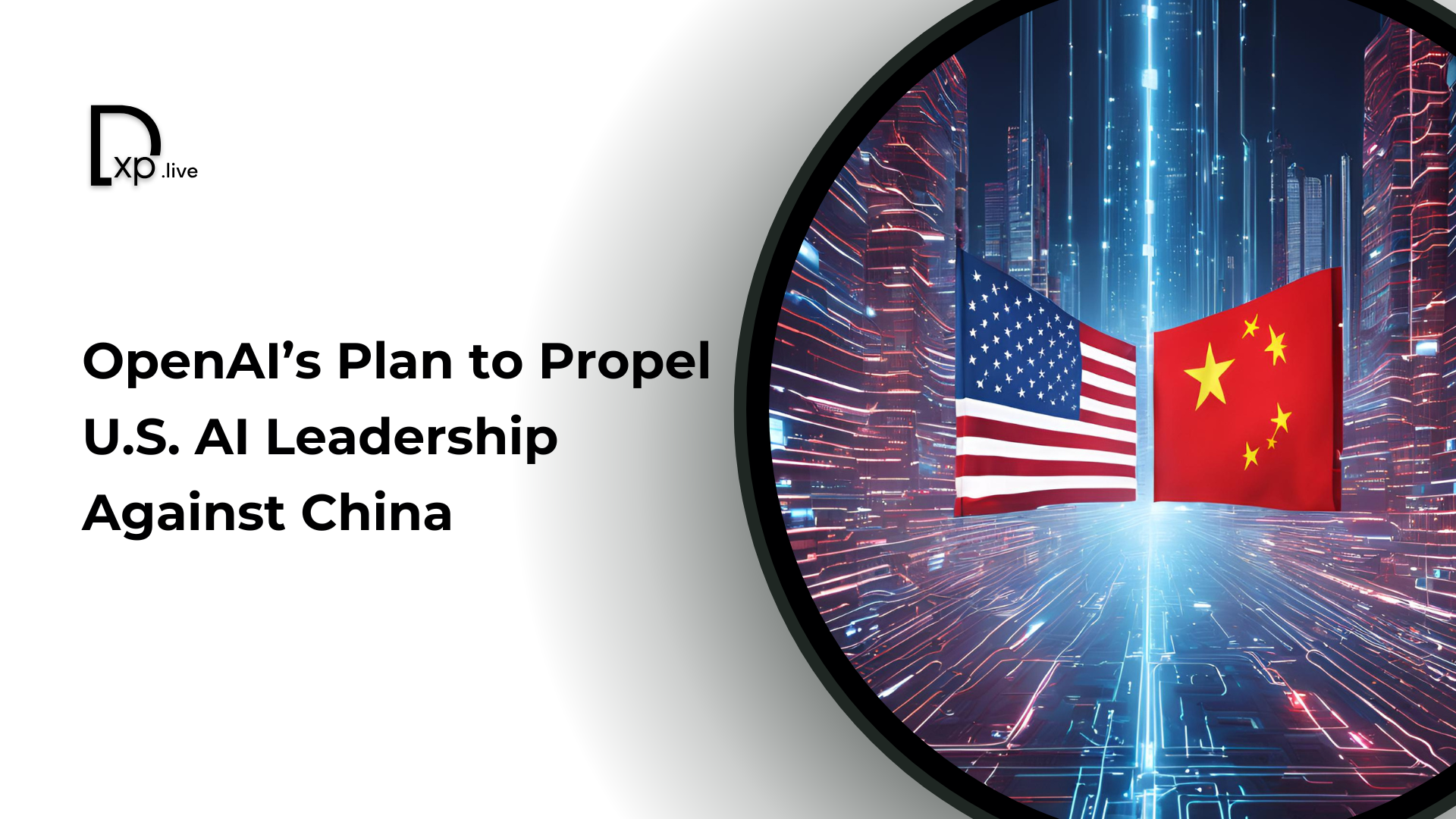
As AI competition between the U.S. and China intensifies, establishing a robust U.S. AI strategy is now more critical than ever. This strategy is essential to safeguard America's position in the evolving "AI supremacy USA vs China" landscape, where OpenAI plays a pivotal role. OpenAI’s upcoming announcement on its U.S. AI policy 2024 not only outlines key advancements in AI infrastructure USA but also highlights plans for an AI alliance with USA companies to counter China's rapid technological strides. With a focus on national AI governance USA and global leadership, OpenAI’s new strategy and alliance aim to ensure that the U.S. remains a leader in safe, innovative, and strategically deployed AI.
Background on the U.S.-China AI Competition
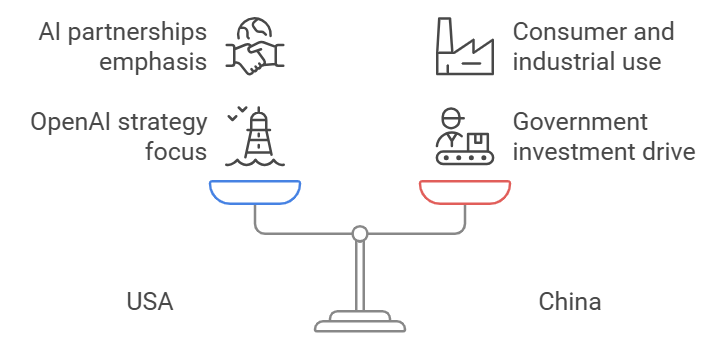
The competition between the USA and China in artificial intelligence (AI) can be described as another landmark step in the development of high-stakes AI competition with a significant impact on technology, economy, as well as national security. As China is ramping up investment in domestic AI through government programs and acquisitions of overseas AI technologies, the U.S. has shifted towards the vision of the “OpenAI” strategy for the U.S. and enhancing “AI partnerships” with major tech players, such as Microsoft. China’s advancement, primarily distilling innovative improvement in automated consumer and industrial uses, forms a strong competitive foundation in API infrastructure to shape AI global leadership.
The effects of this “AI competition China USA,” are vast regarding cybersecurity, economic power, and geopolitical policies. US officials are paying more and more attention to the established phrase “AI governance USA” to maintain the dominance over the strategic rival and within the global race for leadership AI is seen as the decisive factor. With the help of “federal support AI technology” and cooperation with other companies, the USA is to develop not only to match the world’s leaders in the sphere of AI but to outperform them and improve the tendency of “global AI leadership USA.”
The Need for a U.S. AI Strategy
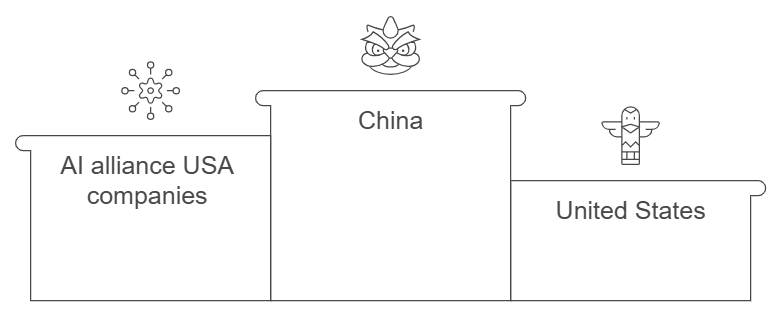
It is for these reasons, that a coherent and well-coordinated AI strategy in the United States of America is important for its economy, security and to be in a vantage position technologically. Under the American AI policy 2024, the AI infrastructure USA would improve significantly, putting America in a better position in the China Vs USA race in AI. At the moment, the United States is trailing on the unification of the AI policy, “US AI R&D funding”, and strategic partnerships in areas such as AI-generated job creation and national security. Chinese AI investments on the other hand are concentrated and such centralized investment has spearheaded high technological advancement as the “AI Competition China USA.” Since big companies such as OpenAI suggest the “AI alliance USA companies” strategy, coalesced federal support is crucial for “meaningful global AI leadership USA”, to develop promising economic benefits and catchy “AI regulation America” policies for further development and safety.
OpenAI’s Vision for U.S. AI Strategy
The following paper aims to present OpenAI’s perspective on the organization of an American strategy for artificial intelligence. Targeted issue areas would probably cover AI regulation in the United States, data responsibility to promote AI alleys, and transparent oversights to sustain the public’s confidence in AI technologies. In the same way, OpenAI may call for stronger regulation norms regarding artificially intelligent systems for only safe and ethical adoption. One of the most important levers of the strategy will probably be the upgrade of AI capacities in the United States, including more investment in research and development and federal support for promising technologies.
The lack of openness by other organizations regarding the nature of their partnership with OpenAI will be critical in a bid to ensure the development of these key new technologies that will ensure OpenAI retains dominance in the global AI race particularly given the emerging China vs USA AI battle. This formation of the AI partnership will achieve these advancements and strengthen the status of technology for America in the world. Even in areas where OpenAI is seeking corporate partners for funds and technology while promoting ethical AI and cooperation, it wants the US to remain the world’s AI champion.
What the Alliance with Tech Companies Could Mean
A strategic alliance among U.S. tech companies could significantly impact the nation’s AI landscape. By pooling resources and expertise, companies like OpenAI, Microsoft, and others could foster a unified front in innovation, accelerating advancements in artificial intelligence. This collaboration could lead to breakthroughs that might otherwise be difficult to achieve individually, boosting the competitiveness of the U.S. in the global AI race, particularly against China.
An alliance also holds the potential for establishing shared ethical standards and policies, crucial for AI governance. Standardizing AI ethics could ensure the responsible use of technology, especially in sensitive sectors like defense and surveillance. These policies would aim to mitigate risks associated with algorithmic biases and misuse.
Moreover, such partnerships could bolster AI research and infrastructure in the U.S., with improvements in high-performance computing and AI education programs. This could pave the way for increased AI investment, elevating the U.S. as a leader in AI research.
Challenges Facing OpenAI’s Strategy and the Alliance
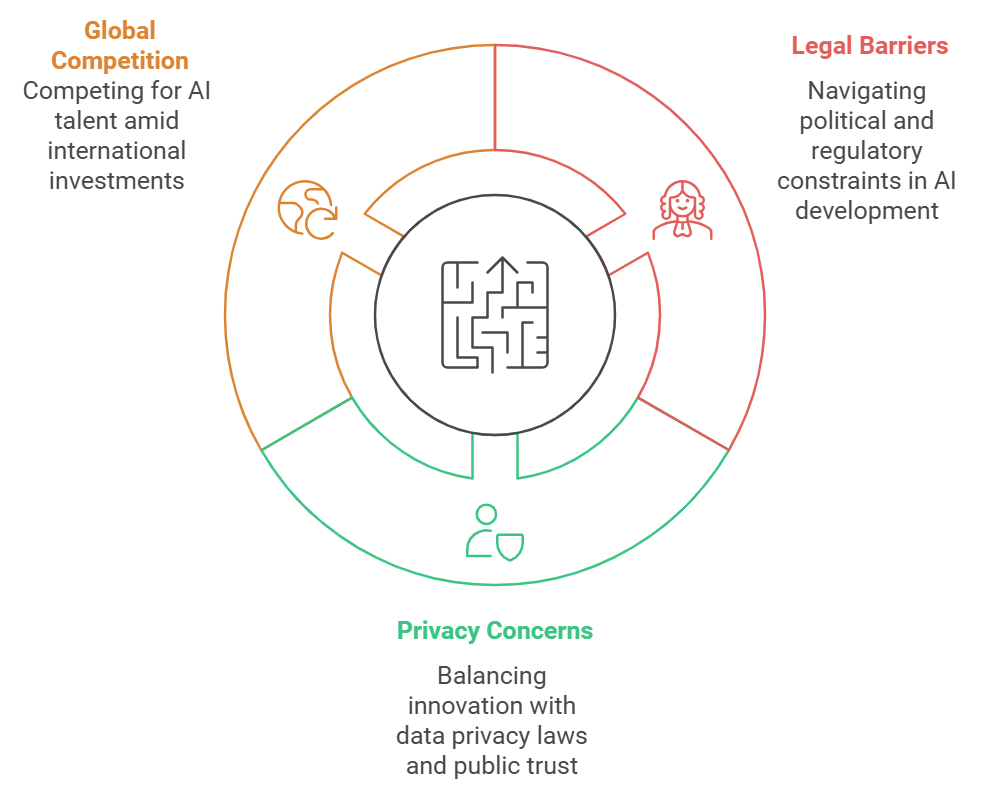
Issues facing OpenAI’s strategy to enhance AI leadership in the US are as follows: Legal barriers such as possible political limitations and AI management challenges can offset technological progress and obscure the application of national AI strategies. So, as regulation surfaces in the US, it is key to continue enhancing progress while maintaining compliance.
Privacy of data also remains a major challenge. Ensuring the public will embrace the development and application of AI is the reason why it is crucial to balance between the innovation of this technology and conformity to the privacies laws.
In addition, there is a high degree of rivalry in the global market for AI talent which OpenAI must overcome. The easy attraction of talented expertise has become a thing of the past since China and Europe are investing in improved AI. These challenges underscore the several pertinent issues that OpenAI has to overcome in order to achieve its grand U.S. AI vision.
Impact on U.S. Businesses and the Economy
A robust U.S. AI strategy could significantly impact American businesses and the economy. By advancing AI governance and investing in key sectors like healthcare, manufacturing, and finance, the U.S. can unlock growth opportunities. AI innovations promise to improve efficiency, drive automation, and enhance decision-making, benefiting industries and fueling economic expansion. Furthermore, AI is poised to create new jobs, especially in tech, research, and development, enhancing innovation across sectors. With a strong AI policy and public-private collaboration, the U.S. can maintain its leadership in the global AI race, competing against China’s technological advancements. A successful AI strategy would solidify the U.S. as a global technology leader, boosting international partnerships and tech dominance.
The Road Ahead: Key Milestones for OpenAI’s U.S. AI Strategy
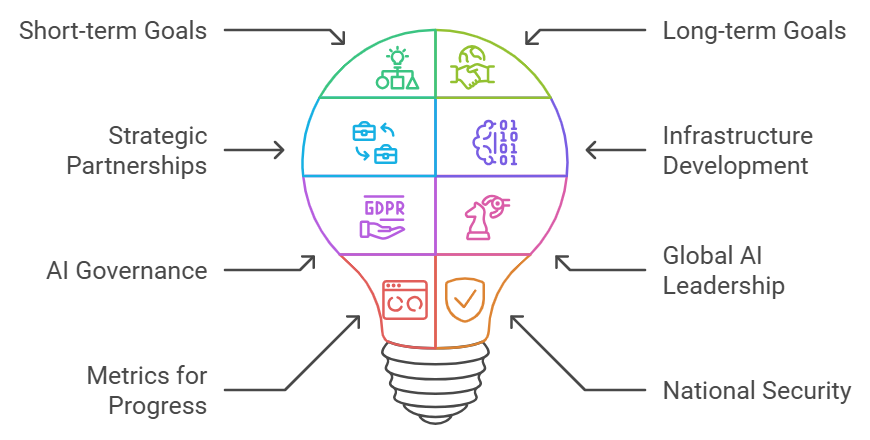
OpenAI’s proposed U.S. AI strategy focuses on both short-term and long-term goals to solidify America’s AI leadership. In the short term, success will rely on fostering strategic partnerships through AI alliances with U.S. companies like Microsoft, driving AI infrastructure development and advancing AI governance with clear regulation. Over the long term, OpenAI’s strategy aims to ensure global AI leadership, positioning the U.S. as the dominant force in the AI competition with China.
To measure progress, metrics such as R&D investment in AI and the creation of effective AI governance frameworks will be key. A successful strategy would not only bolster national security and economic prosperity but also strengthen the U.S.'s role in shaping global AI policy.
In summary, OpenAI’s U.S. AI strategy aims to position America as a leader in the global AI race, leveraging innovation, strategic partnerships, and federal support for AI development. By focusing on collaboration with key players like Microsoft and aligning AI policies, OpenAI seeks to bolster U.S. technological supremacy in the face of China’s growing AI capabilities. This strategy is crucial now, as the competition between the U.S. and China intensifies, especially in AI governance and infrastructure. Strengthening the U.S. AI landscape is vital for maintaining national security, driving economic growth, and ensuring leadership in global AI technology.
Want to read more such interesting articles? Follow us at digitalexperience.live. Also, do not forget to read our insightful conversations with industry experts in our exclusive INTERVIEWS.



